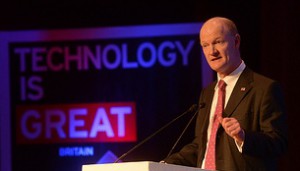In the words of UK Prime Minister David Cameron, the ‘sky is the limit’ for UK-India partnership and this was evident throughout his visit to India (18-20 Feb 2013). The PM’s delegation included David Willetts, Minister of State for Universities and Science, and a host of Vice Chancellors (VCs) from some of the UK’s leading universities, because this potential is particularly present in research and innovation. I was excited about being part of the visit, because I knew a series of new research and innovation initiatives were to be announced.
Many of the organisations present were announcing new partnerships, too numerous to list on this blog, but two key developments were:
- The UK’s Technology Strategy Board and India’s Global Innovation and Technology Alliance were able to further their discussions on a joint programme which will support collaboration between UK and Indian businesses in areas such as smart energy and healthcare technologies.
- As part of its 3rd call for proposals, some of which were released during the summit, UKIERI will be supporting knowledge transfer partnerships to help place researchers in SMEs to work on the commercialisation of their research.
It was also a chance to celebrate the fact that joint UK India research programmes have grown from £1 million in 2008 to over £100 million today!
Alongside the announcements, a round table, chaired by Minister Willetts, on Higher Education and Innovation was a huge success. The objectives of the roundtable were to:
- Identify opportunities for UK and Indian governments and higher education and research institutes to work together to implement innovative approaches to education and developing an innovation eco-system.
- Highlight specific new opportunities for UK and Indian businesses to work together on innovation
Participants included VCs of Indian and UK universities, senior parliamentarians, policymakers, and businesses offering education services. The meeting began with a keynote address from Minister Willetts. He highlighted the crucial challenges of education and innovation for India, and underlined the UK’s commitment to strengthening bilateral ties. He applauded the success of UK-India education and research partnerships, something Dr T. Ramasami, Secretary of India’s Department of Science and Technology, echoed. He stressed that scientists from both the countries should address the problems of the people and encouraged industries to collaborate actively with scientists to discover solutions.
A facilitated session to generate ideas to accelerate Indo-UK collaboration was chaired by Professor Sir Steve Smith, VC of Exeter University. Themes for discussion were: Innovation in education; Universities as innovation hubs; and Innovation in business.
Professor Martin Bean, VC of the Open University, talked about the launch of UK’s first Massive Open Online Course (MOOC) in December 2012. The Indian universities represented were thrilled to know that International students, including those in India, will now have free access to the UK’s top universities through MOOCs.
Professor Sir Leszek Borysiewicz, VC of University of Cambridge, reiterated that universities act as innovation hubs of the future. He gave the example of the Cambridge phenomenon where 52,000 jobs have been created by the companies based in Cambridge and spoke about Cambridge’s association with India, and in particular the Bangalore Cambridge Innovation Network.
________________________________________
Further Reading –
Joint statement on the India-United Kingdom summit 2013 at Hyderabad House, Delhi 19 February.
Strengthening the India-UK partnership in education and skills – write up on UKinIndia
